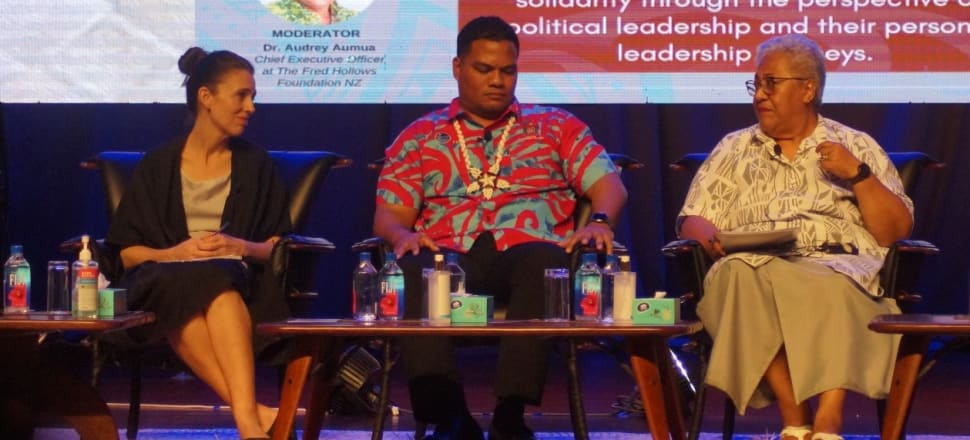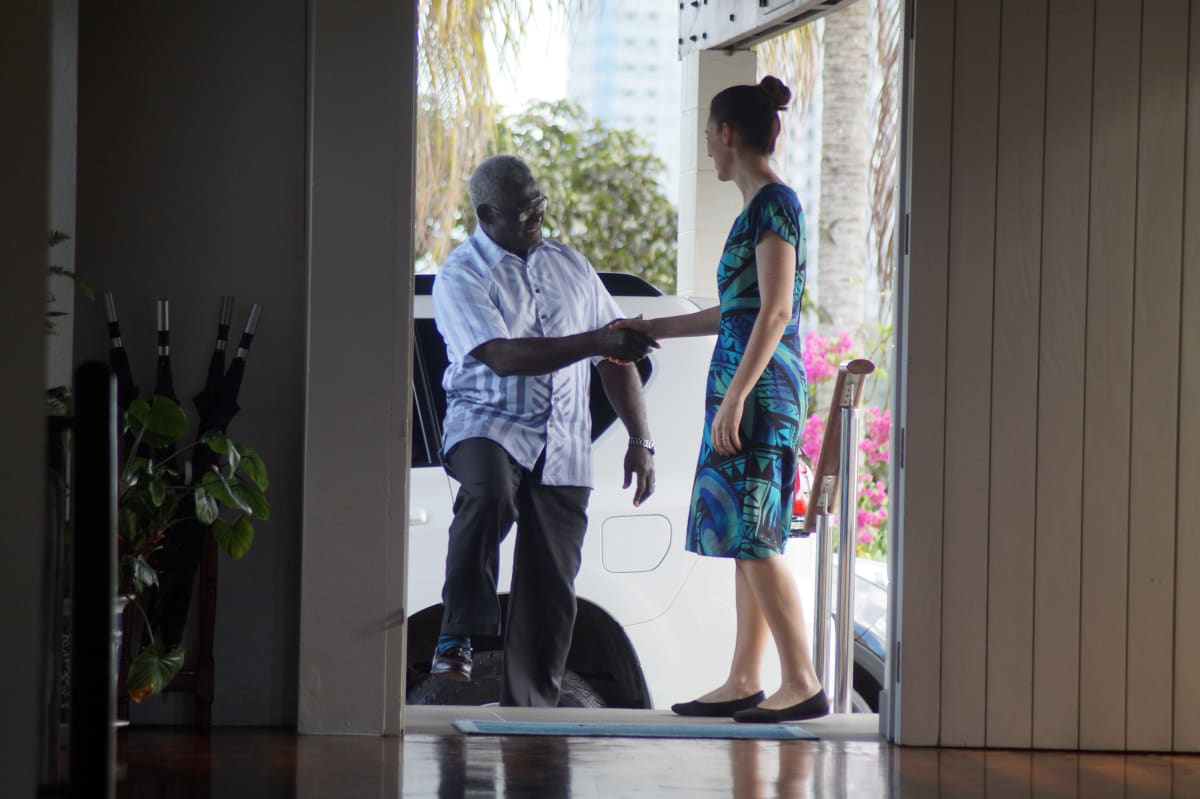
As the Pacific Islands Forum prepares to unveil a regional strategy for the coming decades, leaders are emphasising the need for a joint approach to critical issues. But can that sentiment trump the issues dividing the region? Sam Sachdeva reports from Suva
Having battled through a constitutional crisis to become Samoa’s first female prime minister last year, Fiamē Naomi Mata’afa could be forgiven for wanting to shy away from challenges outside her country.
But speaking to a Pacific Islands Forum talanoa (dialogue) on Wednesday evening, Fiamē raised existential questions about the wider state of the region, with the rules-based order under threat in the wake of the Covid-19 pandemic.
“I'm finding this…a period of real reflection. Have we been doing the right thing? It's almost sort of like we've gone along to get along, and where have we found ourselves? Are we satisfied with that?”
Pacific leaders will ask themselves similar questions on Thursday when they gather at the forum secretariat to thrash out the major issues facing the region and sign off its 2050 Strategy for the Blue Pacific Continent - a document intended to tackle many of those challenges.
But at a time when the Pacific needs solidarity, its most critical organisation is at risk of looking less than unified.
While Kiribati’s outright withdrawal from the forum has drawn the most attention, several other countries have been unable to send their leaders to Suva for a variety of reasons.
Tess Newton Cain, the project lead for the Pacific Hub at the Australia-based Griffiths Asia Institute, told Newsroom it was important not to read too much into the absences of some nations given schedule conflicts were far from unusual.
“You can drive yourself insane second-guessing and triple-guessing why people have or haven't come, and there's more to regional unity and regionalism than this one meeting, there's more to the forum than just this one meeting.”
But with Covid restrictions having impeded regional meetings, and a sizeable agenda to deal with, Newton Cain said the importance of the leaders’ retreat should not be underestimated.
“There is a lot of work to be done in terms of keeping the region together, keeping the Pacific Islands Forum together.”

One country which may feel particular pressure to uphold that togetherness is the Solomon Islands, whose security deal with China earlier this year led to much soul searching about the ramifications for the region.
Prime Minister Jacinda Ardern Ardern met her Solomons counterpart Manasseh Sogavare on Wednesday, having previously expressed concerns about the potential effect of the deal on the Pacific - a worry she repeated face to face.
“New Zealand is strongly supportive of the fact that there will be many aid and development partners in our region, and they have been for many years, but when those relationships tip into the space of being related to security, that's an area where the wider Pacific family has a deep interest.”
Of additional concern is the fact the leaked draft remains the only version of the pact which has been publicly seen, with Ardern emphasising the need for transparency.
That call is complicated by the deal requiring the agreement of both parties for any information to be released, a clause the Solomons has used to explain the lack of openness but which simply begs more questions about what exactly it has signed itself - and the region - up to.
But Ardern and Sogavare found common ground beyond a shared alma mater (the University of Waikato), with the pair reportedly agreeing that the militarisation of the Pacific was an outcome to be avoided.
“We talk a lot about how contested our region is, and there's often that mantra of ‘friends to everyone’ - I hope we tack on to that ‘family first’, that we look to each other in those challenging times but we have confidence…that our values are actually going to carry us through.” - Jacinda Ardern
“His expression was that it is not in the Pacific family or indeed Solomon Islands’ interests to see the militarisation of our region,” the Prime Minister said of Sogavare’s views on the issue.
There was another win on the security front, with Foreign Affairs Minister Nanaia Mahuta announcing a two-year extension of New Zealand’s police contribution to the Solomons.
The forum members have a difficult path to walk when it comes to the issue, needing to be forceful enough to avoid a repeat without sending the Solomon Islands the way of Kiribati in a fit of pique.
Ardern hinted at a potential middle ground in her talanoa remarks about the need for both leaders and the wider Pacific to hold greater confidence in their own abilities.
“We talk a lot about how contested our region is, and there's often that mantra of ‘friends to everyone’ - I hope we tack on to that ‘family first’, that we look to each other in those challenging times but we have confidence…that our values are actually going to carry us through.”
Sea mining, geopolitical manoeuvring among Pacific obstacles
Security is not the only issue where the forum’s members hold dividing views.
Newton Cain told Newsroom deep sea mining was “a significant fault line within the region”, with Federated States of Micronesia president David Panuelo calling for the forum as a whole to endorse Palau and Fiji’s push for a moratorium on the controversial practice.
That would likely be unacceptable to Nauru and the Cook Islands, who have both expressed a desire to mine the seabed in their own maritime zones - but with both countries’ leaders absent from this year’s summit, it remains to be seen whether there is any attempt to include some sort of condemnation in the leaders’ statement.
Then there are the geopolitical manoeuvrings which have hovered over the entire week.
US vice-president Kamala Harris’ unprecedented mid-event speech to the forum, and the suite of new American commitments to the Pacific, was met with glowing praise by forum chair and Fiji prime minister Frank Bainimarama.
It is an unsurprising view given Fiji was the first Pacific nation to sign up to the US Indo-Pacific Economic Framework, and American diplomats have spoken of the country as a potential regional hub for its work.
“We come from countries and societies that are communal, we are brought up on the concept of the collective, and how we look to the greater good, and the welfare of those that we live with." - Fiamē Naomi Mata'afa, Samoa prime minister
Asked by Newsroom what he made of the vice-president’s remarks, forum secretary-general Henry Puna was similarly effusive: “That was very refreshing, and also very reassuring that the Americans are now fully committed to re-engaging with the Pacific in a meaningful and substantive way.”
But Newton Cain said the speech cut against the need to avoid distractions from outsiders and could lead to retaliation by China against the wider Forum members, including Pacific nations who had not pushed for Harris to speak.
“It's just really unfortunate because the Pacific leaders have been saying…that this isn't a chessboard, they're not pawns in someone else's great game - they want to be focused on what's important to them.”
While all those potential minefields could tear the region apart, there is a distinct possibility it could instead bring it closer together, as nations lean on the sense of community that Fiamē so clearly described.
“We come from countries and societies that are communal, we are brought up on the concept of the collective, and how we look to the greater good, and the welfare of those that we live with.
“So it's not some fancy strategy - it's because of who we are."







